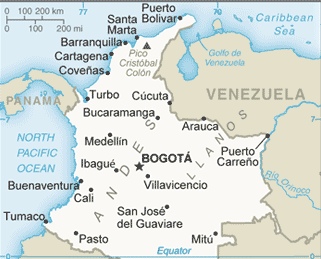
The United States decertified Colombia as a reliable partner in the War on Drugs on Sept. 15, citing a rise in coca cultivation and cocaine production. While the White House waived the crushing sanctions that usually come with decertification, the decision underscores the strained relations between the US and Colombia under President Trump. Alongside Colombia, the administration also decertified Afghanistan, Bolivia, Myanmar, and Venezuela, waiving sanctions for the last three.
The White House was quick to blame Colombian President Gustavo Petro directly, arguing in its submission to Congress that the “failure of Colombia to meet its drug control obligations over the past year rests solely with its political leadership.” Secretary of State Marco Rubio called Petro “erratic” and “not a very good partner in taking on the drug cartels.” Trump’s determination contrasted Petro with the “skill and courage” of Colombia’s security forces and municipal authorities in confronting criminal groups—although the mayors of five major Colombian cities (Bogotá, Medellin, Cali, Barranquilla and Cartagena) visited the United Statesin early September to lobby against decertification.
A longtime critic of the US-led War on Drugs, Petro denounced Trump’s move in a televised cabinet meeting. As he has many times before, Petro blamed US demand for his country’s drug problem. Petro reiterated his opposition to coca eradication efforts, which have largely targeted low-level producers through aerial fumigations of cancer-causing chemicals while arming military (and, by extension, paramilitary) forces to wage war on “narcoguerrillas”—who were too often simply coca-growing peasants. Instead, Petro has sought to target the criminal structures that ship cocaine internationally. Though his government has seized more cocaine than any previous Colombian administration, coca cultivation has tripled in the last decade. Violence as a result of the battle to control the trade has also sharply escalated over the past years.
Petro has also condemned the politicized nature of US drug policy, pointing to the Trump administration’s threats against Venezuelan President Nicolás Maduro and its lethal strikes against alleged drug traffickers at sea. Washington’s use of the term “narco-terrorists” in the announcement of Colombia’s decertification—a term it has also leveled against Maduro—raises fears of broader intervention, moving from the seas to land. Petro’s left-wing politics and defense of migrants have drawn the ire of the Trump administration, and Rubio himself has called the Colombian president an “agent of chaos.”
Given that the Trump administration waived the sanctions that usually follow decertification—including massive cuts in US assistance and an automatic “no” vote on loans from international financial institutions—analysts argued the move was largely symbolic. Nevertheless, Colombia may now struggle to attract foreign investment, one of the many reasons that Washington Office on Latin America (WOLA) warned in the days before the announcement that the US should not decertify. WOLA noted that Colombia’s last decertification in the mid-1990s, which included some sanctions, only spurred a massive boom in drug production, paramilitary and guerrilla territorial expansion, and violence. “The decades-old US practice of judging and punishing other states for allegedly substandard counter-drug performance through decertification is an antiquated, blunt, counterproductive foreign policy tool that should no longer exist,” WOLA wrote ahead of the decision.
Though Washington left the door open to reversing course if the Colombian government takes “more aggressive action,” Petro responded defiantly by freezing arms purchases, rejecting US aid, and accusing the United States of meddling in Colombia’s upcoming 2026 elections. The accusation is not unfounded: the plan by former Foreign Minister Álvaro Leyvato overthrow Petro that was thwarted last June—and detailed in a bombshell report by Spain’s El País—was pitched to US officials and involved decertification as a crucial first step.
From NACLA Update, Sept. 19. Slightly edited. Internal links added.
Note: While Venezuela and Myanmar (Burma) have been frequently decertified over the years, this marks the first time Colombia has been decertified since 1997. Colombia was decertified in 1996 and 1997 with no “national interest waiver” from sanctions.
Map: PCL




